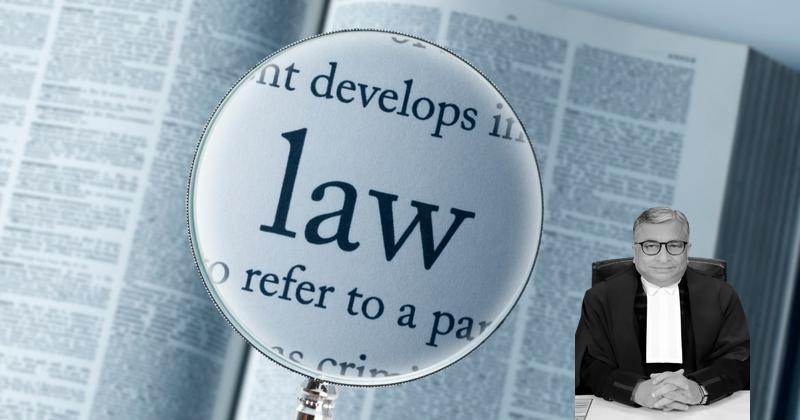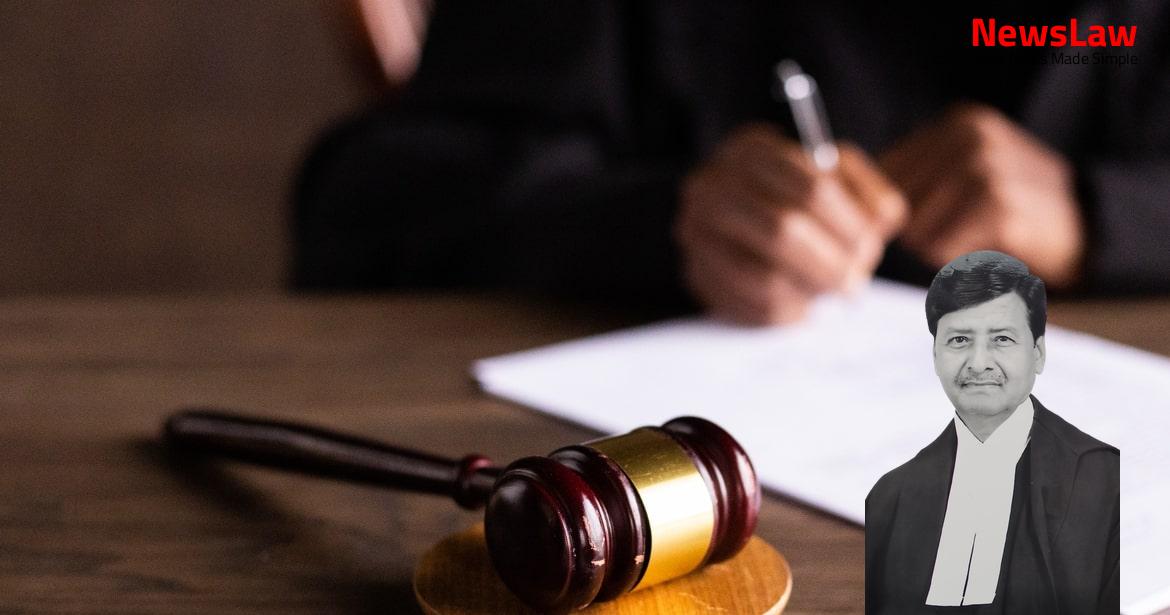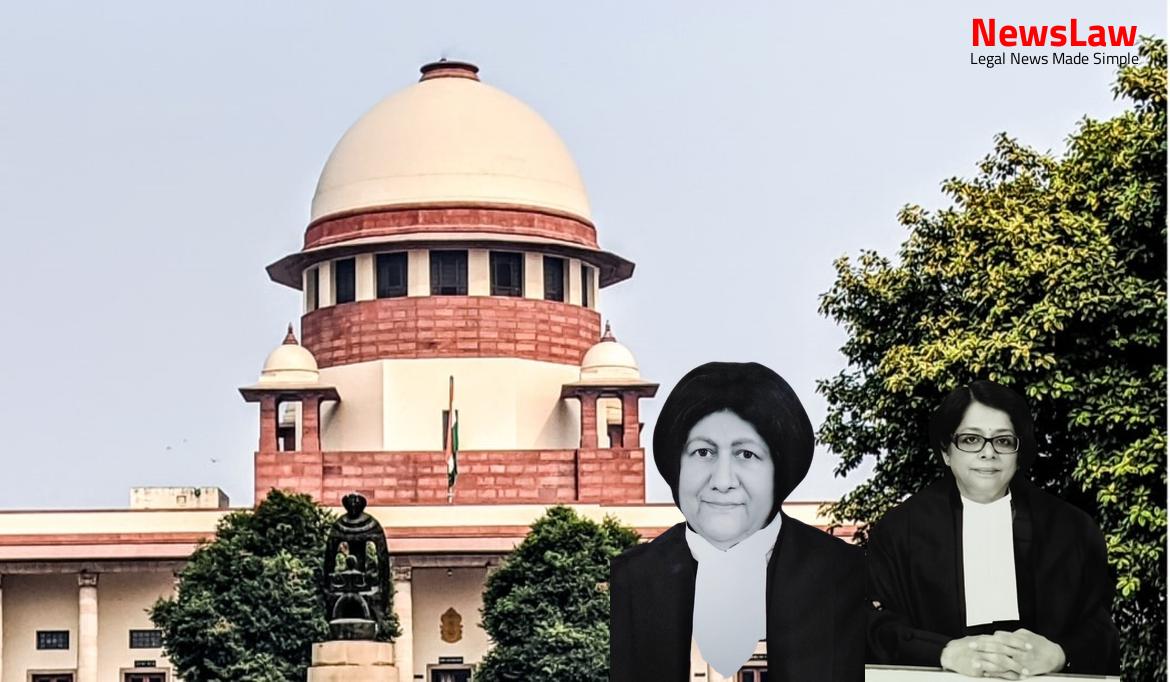The writ petitioner, who is a Non-Resident Indian (for short, ‘NRI’), was arrested on 04.10.2022 at the Delhi International Airport. The petitioner, being an NRI, has been unable to travel outside India since 06.10.2022, and as such has been amenable to settle the dispute by approaching the settlement commission under Section 127 of the Customs Act, by paying the dues and any interest accrued thereon to the customs department in accordance with law. filed by the petitioner, an ex-parte order dated 20.02.2023 was passed by this Court, wherein the Commissioner of Customs 2 was directed to issue a show-cause notice to the petitioner, to initiate the proceedings. When the abovementioned conflict between the two High Court judgments was brought to our notice, it was pointed out to us by the learned counsel appearing on behalf of the petitioner that such conflict between the two High Court judgments, if left unnoticed, has the potential to cause great harm to accused persons charged under the Customs Act, and deprive them of the power to invoke the remedy of settlement. The Settlement Commission, governed by chapter A of the Customs Act, was inserted by virtue of Section 102 of the Finance (No.2) Act, 1998 (Act No XXI of 1998), with the aim of settling issues of tax evasion by virtue of a disclosure by the tax offender. PRELIMINARY OBJECTION 11.During the course of the hearing, a preliminary objection has been raised by the learned counsel appearing on behalf of the respondent stating that since the original relief sought for was limited to the grant of providing home cooked meals to undertrial prisoners, this court is not the appropriate forum to decide on the present question of law and resolve the conflict between the two High Court judgments. If such an opportunity to clear the said ambiguity is not exercised by this court, it would so happen that, at some point in the future, this court would again be tasked with answering the same question of law, for which, a great length of time would again be spent by the court, to complete the same task which could have been dealt with at an earlier time.
It is therefore imperative that this court, at this instance, remedy such a mischief, to save the court and future litigants from multiplicity of proceedings and mischief caused by such ambiguity. To curb this inclination of the state at its very roots, the constitutional scheme envisaged an organ within the state machinery, namely the judicial organ, which is vested with the powers to interfere with the tyrannical tendencies of the state. During the constituent assembly debates, when the question of the ambit of Article 32, which was then Article 25 of the draft constitution, was posed, the makers of the Constitution deliberated extensively on the scope of the said article and the extent of its powers.
It is the very soul of the Constitution and the very heart of it
and I am glad that the House has realised its importance.” Further, Father Jerome D’Souza, a Member of the Constituent Assembly, while emphasizing on the importance of Article 32 of the Constitution of India stated as follows: “I should like to draw the attention of the House, Sir, to the implications of this article, implications which possibly are not obvious at the first reading. As I said, Sir, the implication of this is that an individual must be protected even against the collective action of people who may not fully appreciate his needs, his rights, his claims. I say, Sir, further that in the last analysis we have to make an appeal to a moral law and through the moral law to a Supreme Being, if the highest and the fullest authority is to be given and the most stable sanction to be secured for these fundamental rights. When we consider that Part, let us recall these Rights and make sure that all these various provisions will be enforced in a just and fearless manner.” It is in this background that Article 32 of the Constitution of India has been brought into force, to ensure that the Supreme Court is always equipped to tackle the other organs of the state, especially in circumstances wherein civil and individual liberties guaranteed by the fundamental rights are at risk. In such a circumstance, where similarly situated persons are becoming victim to differential outcomes, this court must clarify such an ambiguity, by resolving the conflict between the two sets of judgments, to ensure that the 1 2015 SCC Online Del 11542 2 2015 SCC Online Del 13875 3 2019
SCC Online Del 6574 10 mischief caused by the conflicting views is erased, and the certainty in law is restored.
The petitioner therein was amenable to settle the dues, and seek relief under Section 127 of the Customs Act, however, the goods seized were explicitly mentioned in Section 123 of the Customs Act, which put a bar on settlement of cases under Section 127 B of the said Act. Once the origin of the goods was not in dispute, the Respondents as held by the Settlement Commission were entitled to invoke the jurisdiction of the Settlement Commission and, therefore, the bar contained in the proviso to Section 127B could not have come in their way. In this case, while the settlement application of the petitioner was deemed to be maintainable, however, in paragraph 10 of the said judgment, a passing reference was made by the court stating that the goods found on the person of the petitioner, since they did not find mention under Section 123 of the Customs Act, were not barred by Section 127 of the same Act.
Shri Ram Niwas Verma (supra), was a case where imported goods were covered under the third Proviso to Section 127B(1) and, therefore, the said decision is distinguishable on facts.” To clear this cloud of ambiguity, and to settle the conflict between these two sets of High Court judgments, we must first analyze Section 123 and Section 127 B of the Customs Act. (1) Any importer, exporter or any other person (hereinafter referred to as the applicant in this Chapter) may, in respect of a case, relating to him make an application, before adjudication to the Settlement Commission to have the case settled, in such form 13 and in such manner as may be specified by rules, and containing a full and true disclosure of his duty liability which has not been disclosed before the proper officer, the manner in which such liability has been incurred, the additional amount of customs duty accepted to be payable by him and such other particulars as may be specified by rules including the particulars of such dutiable goods in respect of which he admits short levy on account of misclassification, under-valuation or inapplicability of exemption notification [or otherwise] and such application shall be disposed of in the manner hereinafter provided: Provided that no such application shall be made unless,— (a) the applicant has filed a bill of entry, or a shipping bill, in respect of import or export of such goods, as the case may be, and in relation to such bill of entry or shipping bill, a show cause notice has been issued to him by the proper officer; (b) the additional amount of duty accepted In simpler terms, this would mean that in such cases, it is the accused who is tasked with proving his innocence, rather than the prosecution proving the accused person’s guilt.
In light of the abovementioned discussion therefore, in cases of seizure within the customs area, Section 123 of the Customs Act cannot apply and hence, the decision in the Suresh Judgement (Supra) passed by the High Court of Judicature at Bombay states the correct position of law. While the conflict between the two sets of High Court judgments has been brought to an end, certain other issues flowing from the said interpretation, in our opinion, must also be clarified. If a passenger opts for the green channel mode of entry, it implies that the passenger, by virtue of not opting for the red channel mode of entry, is stating that he has no goods that are liable to duty, and hence, it is deemed that they are making a declaration under Section 77 of the Customs Act of carrying “Nil” dutiable goods. Further, if we were to accept the proposition that a non-declaration under Section 77 of the Customs Act would automatically bar the incoming passenger from availing the benefit of settlement, in light of our observation 17 that an entry through the green channel mode implies a declaration of “Nil” goods under Section 77 of the Act, the provision of settlement would become irrelevant and defunct, since no accused would ever be able to avail the benefits of settlement. The learned counsel appearing on behalf of the respondent contended that any person who importing the impugned goods at the instance of another person, is a smuggler, and as such, the Settlement Commission cannot be approached in such cases. …” 41.Further, the abovementioned judgment of the Bombay high court was impugned in the Supreme Court by way of an appeal, and the same was dismissed by this Court vide order dated 03.08.2011, further fortifying the judgment of the High Court. However, we deem it appropriate to observe that, if at all, the Settlement Commission would deem fit, it can always seek further report from the “Commission (Investigation)” appointed within the Settlement Commission even after issuance of the show cause notice for this one time opportunity of settlement. Two issues arise for consideration before us; One whether a settlement remedy under Section 127B of the Customs Act, 1962, would be available for the seized goods, which are specified under Section 123 of the said Act? The Customs Act, 1962 (hereafter referred to as the Act) was enacted to consolidate the provisions relating to sea customs, land customs and air customs into one comprehensive measure.
Chapter III specifies the appointment of customs ports and airports wherein imported goods shall be unloaded, and export goods shall be loaded & cleared. In this Chapter, an officer of customs is empowered 4 to arrest a person under Section 105 if he has reason to believe that such a person may have made a false declaration (Section 132), obstructed a customs officer (Section 133) or evaded customs duty that is liable to be paid (Section 135). Given the above, it is evident that the scheme of the act involves the imposition of customs duty, confiscation of goods and consequences of skirting or attempting to skirt the same in the form of varied penal consequences, including imprisonment. Burden of proof in certain cases.— (1) Where any goods to which this section applies are seized under this Act in the reasonable belief that they are smuggled goods, the burden of proving that they are not smuggled goods shall be— (a) in a case where such seizure is made from the possession of any person,— (i) on the person from whose possession the goods were seized; and (ii) if any person, other than the person from whose possession the goods were seized, claims to be the owner thereof, also on such other person; 6 (b) in any other case, on the person, if any, who claims to be the owner of the goods so seized.
Application for settlement of cases.— (1) Any importer, exporter or any other person (hereinafter referred to as the applicant in this Chapter) may, in respect of a case, relating to him make an application, before adjudication to the Settlement Commission to have the case settled, in such form and in such manner as may be specified by rules, and containing a full and true disclosure of his duty liability which has not been disclosed before the proper officer, the manner in which such liability has been incurred, the additional amount of customs duty accepted to be payable by him and such other particulars as may be specified by rules including the particulars of such dutiable goods in respect of which he admits short levy on account of misclassification, under-valuation or inapplicability of exemption notification [or otherwise] and such application shall be disposed of in the manner hereinafter provided : Provided that no such application shall be made unless,— (a) the applicant has filed a bill of entry, or a shipping bill, in respect of import or export of such goods, as the case may be, and in relation to such bill of entry or shipping bill, a show cause notice has been issued to him by the proper officer; 7 ( 487 (Bom.), wherein the High Court observed that in a situation where there is no dispute as to the origin of the goods, the bar contained in the proviso to Section 127B would not come in the way, in respect of the specified goods under Section 123. Even without any controversy about the origin of the goods, Section 127B of the Act would not apply for settlement in respect of the goods enumerated under Section 123 as this goes against the statutory scheme of penal consequences for committing certain offences such as for evading duty, as alleged in the present case, under Section 135. This would make the legislative intent 10 behind the proviso to Section 127B, which bars certain goods, including those mentioned under Section 123 and goods which are prohibited under the Narcotic Drugs Psychotropic Substances Act, 1985, redundant. Importantly, as a consequence of such an interpretation being accepted, the power to prohibit the importation of goods for the maintenance of security of India under Section 11, the powers of arrest under Section 105, the power to summon under Section 108, confiscation under Section 111 and offences for which imprisonment may be given from Sections 132 to Section 135 would have no application, thereby making the respective legislative provisions in effect, null. Avinash Dawar & Anr., 2015
SCC Online Del 13875 (2-Judge Bench of the Delhi High Court), the Settlement Commission held that since there is an admission of illicit importation, shifting of burden as contemplated under Section 123 of Customs Act, is not required.
In the present case, the recovery from the Petitioner was on crossing the green channel at the Delhi airport on 05.10.2022, wherein the officers of the Investigating Agency apprehended him with dutiable goods, including watches of admitted foreign origin. I have considered the law on the merits of the dispute; however, it is also essential to consider the maintainability of the present proceedings since the Petitioner has invoked Article 32 of the Constitution of India.
, this Court dealing with the issue of enforcement of the provisions of the Customs Act, in a petition filed under Article 32, observed that the Petitioner has no fundamental right as such to clear any goods imported in accordance with the law.
Also Read: https://newslaw.in/supreme-court/modification-of-final-order-for-placement-of-sale-proceeds/
Recourse to the fundamental right to approach this Court has to be permitted in cases where the fundamental rights of the Petitioner have been infringed. (SANJAY KAROL) DATED: 4 MAY, 2023 PLACE: NEW DELHI
Case Title: YAMAL MANOJBHAI Vs. UNION OF INDIA (2023 INSC 498)
Case Number: W.P.(Crl.) No.-000055 / 2023



